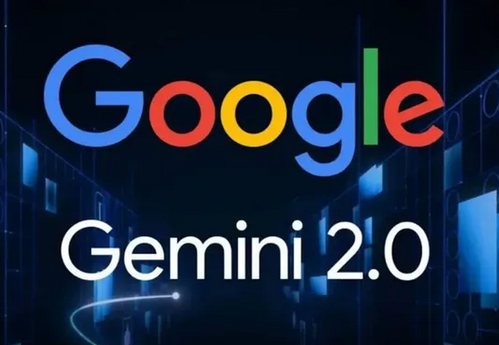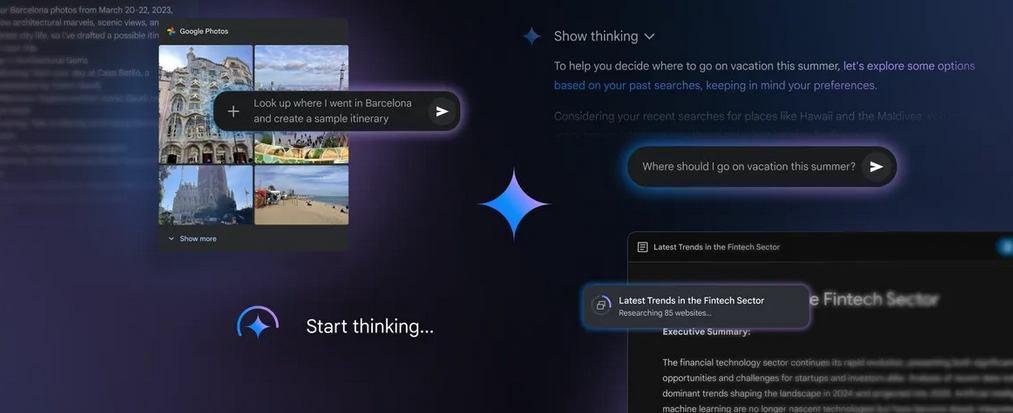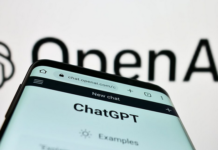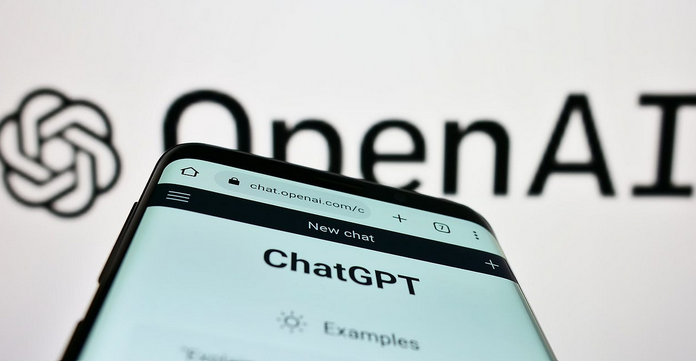Gemini 2.0: Google’s Ultimate AI Upgrade – Smarter, Faster, and More Personal Than Ever

The article delves into the major upgrades that Google has made to its Gemini AI platform, positioning it as a formidable contender in the rapidly evolving world of AI assistants. Google isn’t just keeping up with the competition; it’s accelerating, enhancing its AI capabilities to such an extent that Gemini now promises a far more personalised, powerful, and efficient experience. The changes make it clear that Gemini is not just answering your questions—it’s learning how to serve you better by understanding your habits, preferences, and needs.
Gemini 2.0 Flash Thinking Experimental Model: A Major Leap in Speed and Precision
The first major upgrade is the Gemini 2.0 Flash Thinking Experimental Model. In layman’s terms, this means Gemini has been enhanced to handle tasks more effectively and break down complex requests into more manageable chunks. Essentially, this change enables the AI to operate faster, making it quicker and more precise when responding to your enquiries. Whether you’re asking Gemini to help you draft an email, find the best bakery in your neighbourhood, or summarise a research paper for a project, the updated Gemini is significantly better at processing and answering in a timely manner.

But perhaps the most revolutionary feature of Gemini 2.0 is the 1-million-token context window. For those unfamiliar with AI lingo, this means that Gemini can now hold and process an enormous amount of data at once—around 750,000 words, to be exact. To put this in perspective, imagine an AI that can hold the entire contents of a full-length novel in its “working memory” and still recall past interactions without losing any details. For anyone who needs to analyse large datasets, dive into in-depth research, or engage in lengthy, multi-step conversations without worrying that the AI will forget crucial information, this improvement is a game-changer. With its increased memory capacity, Gemini can now handle complex, multi-layered tasks with ease, making it a more effective assistant for both personal and professional use.
Deep Research: Gemini as Your Personal Research Assistant
Next up, we have the Deep Research feature, which has received a significant upgrade. Initially a premium service, this tool is now available to all users. This feature transforms Gemini into a full-fledged research assistant that can scour the web for information and condense it into detailed, multi-page reports. Imagine having a digital research assistant that can help you with everything from academic papers to professional reports, pulling together insights from various sources and synthesising them in an easily digestible format.
What sets Deep Research apart is that Gemini doesn’t just present the final results—it provides a behind-the-scenes look at its reasoning process. This level of transparency is a huge step forward in building trust with users. It helps you understand exactly how Gemini arrived at its conclusions and recommendations, rather than just trusting the answers it provides. This level of insight can be invaluable, especially for those who are looking to make informed decisions based on well-researched data. This feature is an incredibly valuable tool for anyone involved in deep research, whether you’re a student, a professional, or just someone who loves diving into new topics.
Gems: Tailoring Your AI to Your Specific Needs
One of the most exciting features in this update is Gems, which are customisable AI personalities. With Gems, Google allows you to create AI assistants that are fine-tuned for specific tasks, such as career advice, fitness coaching, or even creative writing assistance. Think of Gems as mini-Geminis, each with a special focus and purpose.
The beauty of this feature lies in its flexibility. You can choose from a range of pre-designed Gems, like Brainstormer, Career Guide, or Writing Editor, or you can create your own personalised Gem for whatever task you need help with. Want an AI that helps you stay on track with your diet goals? Or maybe you’re looking for one that talks like Shakespeare for some light-hearted fun? The possibilities are endless. You can also tweak your AI’s personality to make it more aligned with your needs, so it’s more effective at assisting you in achieving your goals.
These Gems are available for free users over the age of 18, which is fantastic news. However, there’s one small catch: you’ll need to use a desktop to create your Gems, though once they’re set up, you can interact with them on mobile devices. It’s a great way to personalise your AI assistant, and with these tailored mini-Geminis, you can truly have an assistant that fits your life and work, rather than a one-size-fits-all solution.
Personalisation: Gemini That Understands You
Perhaps the most controversial—and intriguing—update in the Gemini 2.0 platform is Personalisation. This experimental feature makes Gemini’s responses more tailored to you by using your Google activity data. What does that mean in practical terms? Well, if you ask Gemini for restaurant recommendations, it won’t just pull up the latest trending spots—it will take your past search history into account and suggest places that align with your tastes. Similarly, if you’re planning a trip, Gemini might suggest destinations that mirror places you’ve visited in the past or searched for, creating a more personalised and proactive assistant experience.
This ability to customise its responses based on your behaviour makes Gemini feel less like a traditional chatbot and more like an intuitive personal assistant that knows your preferences. However, this personalisation feature does raise some privacy concerns. After all, Google is using your activity data to tailor its responses, and not everyone is comfortable with the idea of their AI assistant having access to so much personal information.
The good news is that Personalisation is entirely opt-in. If you choose to enable this feature, Gemini will notify you about which data sources it’s using. Additionally, you can disconnect from the feature at any time, giving you full control over your data. Google has also ensured that users under the age of 18 will not be able to use this feature, offering some peace of mind for parents concerned about privacy. For those who opt in, however, this feature can enhance the overall Gemini experience by making it feel much more attuned to your unique needs.
Gemini’s Expanded App Integration: Multitasking Made Easy
Another major update to Gemini is its ability to seamlessly integrate with multiple Google apps at once. This feature significantly expands its functionality. Now, Gemini can connect with your Google Calendar, Notes, Tasks, and even Google Photos, allowing you to issue multi-step, complex commands. For example, you can tell Gemini to find an easy cookie recipe on YouTube, add the ingredients to your shopping list, and then locate a nearby grocery store that’s still open—simultaneously.
This integration allows Gemini to juggle multiple tasks and apps without missing a beat, which is a major time-saver for busy users. And one of the most anticipated updates is the Google Photos integration, which is coming soon. This update will allow you to ask Gemini to find pictures from specific trips, organise your photo library, and even remind you about important events or renewals based on images you’ve saved. It’s like having a digital assistant with a photographic memory that can help you manage your life more efficiently.
Free vs Paid Features: What’s Available to You?
While many of the updates and features are available to free users, there are still some premium options for those who want the full Gemini experience. Gemini Advanced, a subscription service costing £20 per month, unlocks premium features like the massive context window, file uploads, and priority access to new features as they’re rolled out.
Google has also hinted that some of the features available to free users now may eventually come with limitations, so if you’re enjoying these perks, it’s a good idea to make the most of them while you can. If you’re someone who needs the full suite of tools and capabilities, then upgrading to Gemini Advanced will likely be worth the cost, given the power and flexibility it offers.
Final Thoughts: Gemini as the Future of AI Assistants?
With these updates, Google is positioning Gemini as the ultimate AI assistant—one that is faster, smarter, and more personalised than anything else on the market. The expanded reasoning abilities, deep research tools, and more customised user experience make it a powerful competitor in the AI assistant space. Google is clearly aiming to outpace rivals like ChatGPT and Alexa by creating an AI that doesn’t just answer questions, but adapts to and anticipates the needs of individual users.
That said, the balance between convenience and privacy will be a crucial issue going forward. While Google is making efforts to ensure transparency and control, there will always be users who are cautious about AI systems that gather and analyse personal data. Whether or not people will fully embrace the personalisation features remains to be seen, but the sheer convenience of having an AI that knows you could be a significant selling point for many.
Ultimately, the future of AI assistants seems to be shifting from basic response systems to highly personalised, proactive helpers that can anticipate our needs. Whether that’s a future we embrace or one that causes us to yearn for the days when our chatbots were simple and non-intrusive will depend on each person’s comfort level with AI and privacy. But one thing is clear—Google’s Gemini is pushing the boundaries of what AI can do, and it’s going to play a major role in shaping the future of how we interact with technology.


















